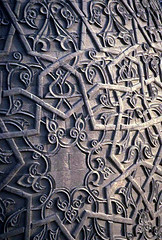Yes, the laptop battery died, but the conference did continue. A few notes from a conversation among historians...
John Corrigan, Department of Religious Studies, Florida State University, gave a wonderful reflection on “Grand Narrative,” asking is it still useful to utilize Grand Narratives in religious history? His answer is “yes,” although it is a qualified yes with a discussion of what might constitute for him an ideal approach.
With a mix of boldness and caution, historians can focus on discrete events while making humans alive, although they come to life as individuals who are embedded within groups (rather than autonomous beings confined to psychodynamic mechanisms) and layered in multiple contextualizations of cultural, ideological, and structural currents (rather than monistic conceptions of deterministic social forces).
Corrigan even described this way of writing history as being like “burying people alive” which I take as articulating the real behavior of people while layering the multiple structural conditions that enable and constraint their behavior regardless of their level of awareness to such conditions.
It's also a history that can generalize -- even posit “cause and effect” relationships -- and incorporate an engaged observation of human behavior at the ground level.
Dennis Dickerson, Department of History, Vanderbilt University, spoke at some length about the failure of historians to develop and explore broader issues. He not only agrees with Corrigan that Grand Narratives remain useful and important but also insists that monographs are required for many arenas of study simply because of the need for more in-depth analysis.
Monographs provide more data and context. More importantly, monographs allow the narrative room to engage broader issues that can draw a broader circle of corporate inquiry.
Robert Orsi, Department of Religious Studies, Northwestern University remains provocative in talking this afternoon about reconceptualizing historical engagement with religious experience.
Historians need to refuse to subordinate “gods, saints, ghosts, Jesus, etc.," to social categories that dismiss such entities as epiphenomena of other, "more real" forces. Instead, he argues that historians need to accept these as generative sources of activity that have historical life and agency on their own.
Orsi called these "imaginary beings,” but in the most complementary sense of the word as real beings who are socially consequential. Historians should not sidestep the reality of these presences but rather show how these presences become real and consequential in personal experience and in the making of history.
Saturday, June 6, 2009
Subscribe to:
Post Comments (Atom)





2 comments:
How does Orsi's position differ from our own disciplinary notion that "things perceived to be real are real in their consequences"? Or, for that matter, Bellah's call 40 years ago, for "symbolic realism" (which is actually a stronger causal statement -- it's not just the perception, but the symbol itself, that has consequences). Orsi manages to make his argument in such wonderfully provocative and literary ways, but I'm not convinced that his position is all that new.
I agree, Nancy. Interpretive sociology certainly takes this assumption for granted - yet it appears that among historians this is a bold notion that challenges assumptions about the mechanisms of history. And I think you and I have both seen how theoretical assumptions within sociology can dismiss "gods and ghosts" in favor of other more favored, seemingly more "concrete," phenomena.
Post a Comment